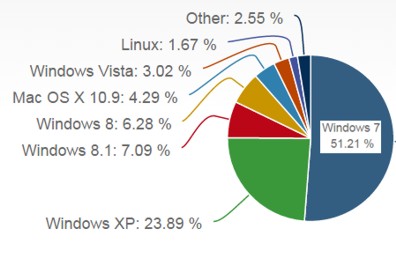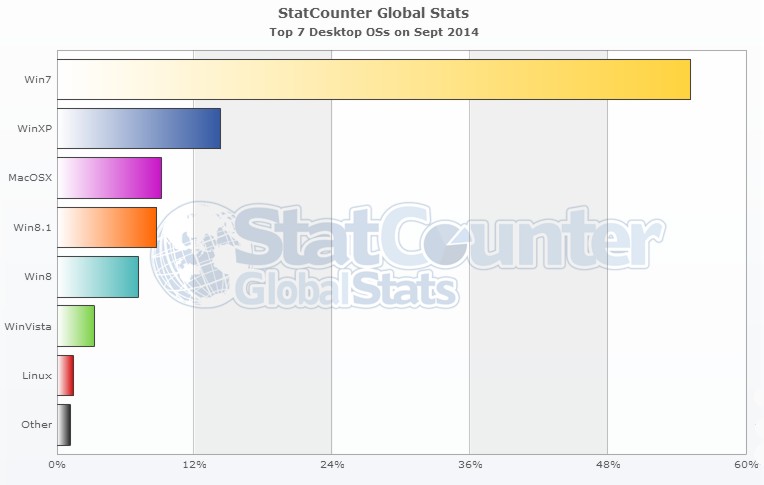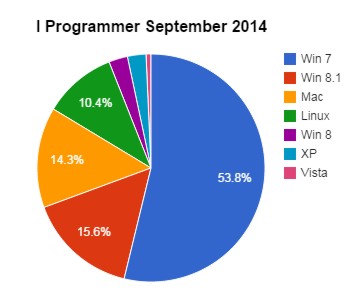| Windows XP Lives On |
| Written by Janet Swift |
| Wednesday, 10 September 2014 |
|
It is six months since the end of support for Windows XP. So has there been a dramatic shift way from it? It depends whose figures you believe. The NetMarketShare Desktop Operating System pie chart for the end of August shows that on a global basis Windows XP is still the OS used by 23.89% of visitors to sites the company monitors - more than 40,000 websites. So while this represents a decline of 2.4% since April it still puts it firmly in second place to Windows 7 which has over half the desktop OS share.
Since April Windows 8.1 has overtaken Windows 8 in terms of share. In the latest pie chart its slice is 7.09% compared to 5.88% in April. However, Windows 8 which had been in decline from its 6.36% share in April to 5.92% in July, rebounded a little in August to 6.28%.
From NetMarketShare's figures even if you add together Windows 8 and 8.1 share it still falls short of XP's share. A different picture is provided by StatCounter, whose figures come from a network of more than 3 million websites.
According to StatCounter's Global Stats Windows XP now has only 14.22% share whereas putting Windows 8 and 8.1 together makes its combined share 15.66%. However this still doesn't represent a dramatic decline for XP which was already at only 17.6% in April. According to Stat Counter's figures Windows 8.1 only overtook Windows 8 in August - whereas we'd reported Windows 8.1 Overtakes Windows 8, based on NetMarketShare's May figures. From IProgrammer's Google analytics XP appears to have had a marked decline over the past 6 months - almost a third fewer users of XP in September than in April. However in April XP already accounted for only 5% of visitors (7% of Windows-based traffic which accounts for 70% of total traffic) so in numerical terms it isn't that many people switching away. Windows 8.1 is the operating system that has seen the biggest upturn in users - again almost a third - but as 15% of Windows using visitors already used 8.1 in April this represents quite a lot of new users. Windows 7 meanwhile reamains steady accounting for 54% of all visitors and 70% of the Windows segment. The chart of the top seven Desktop Operating Systems for September to date gives a result that is unlike either of the NetMarketShare's or StatCounter's, with Windows 8.1 in second place, followed by Mac and Linux and Windows 8 at 2.7% and XP at 2.6%. Vista is the vanishingly small slice with 0.7% of visitors.
As an English-language technical and computer-oriented website our audience would be expected to be rather different from that of the "average" website so it's not surprising that the proportion of Windows XP users is so low and that of Windows 8.x is high. However, gathering statistics based on website visitors is probably gives a huge underestimate of how XP is lingering on. If you look instead at computers that run custom programs in areas such as government and health services the the proportion that are stuck with XP is likely to be higher than any of these sources suggest. Back in January we reported that 95% of the world's ATM machines were still running XP - and the changeover to something more modern is unlikely to happen quickly. The new sport of XP spotting is gaining in popularity and probably will gain even more as XP declines and becomes increasingly rare. Now a visit to the doctor, dentist, ophthalmologist, etc, can be a rewarding opportunity to spot XP still in active use on the desktop, not to mention VB6 and Access! So far there hasn't been an apocalyptic security event to shake people's confidence in XP so I imagine lots of people are taking the attitude of "if it aint broke don't hurry to fix it" - assuming that there is a fix. More InformationRelated ArticlesXP Officially Dead - What Next? Windows XP Loses Share Windows 8.1 Gains Windows 8.1 Overtakes Windows 8 ATMs Not Ready For XP Deadline To be informed about new articles on I Programmer, install the I Programmer Toolbar, subscribe to the RSS feed, follow us on, Twitter, Facebook, Google+ or Linkedin, or sign up for our weekly newsletter.
Comments
or email your comment to: comments@i-programmer.info
|
| Last Updated ( Wednesday, 10 September 2014 ) |





